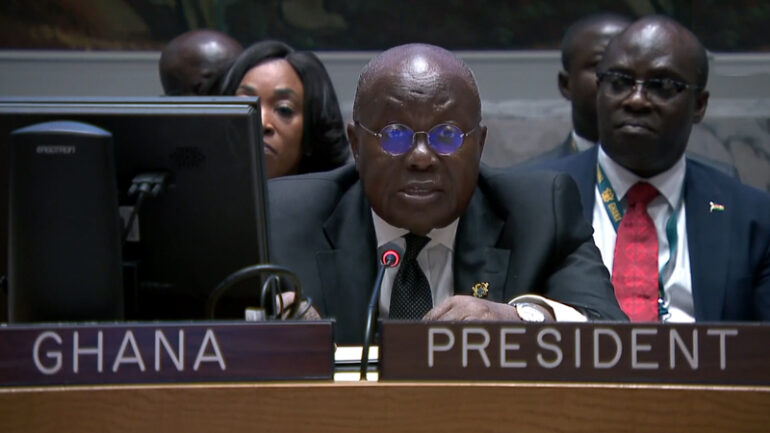UN High-level debate with Heads of State on Counter-terrorism in Africa

HIGH-LEVEL DEBATE OF THE SECURITY COUNCIL ON “COUNTER-TERRORISM IN AFRICA- AN IMPERATIVE FOR PEACE, SECURITY AND DEVELOPMENT”
UN Deputy Secretary-General,
Excellencies,
The last time I was in this hallowed hall, I came in my capacity as the then Foreign Minister of Ghana. Sixteen (16) years later, I am happy to be here, once again, addressing this august gathering, this time as President of the Republic, having overseen my country’s successful bid for a non-permanent seat on the Council. I want to assure all Member States that Ghana, as we have often stated, will work to address our collective interest, as spelt out
in the United Nations Charter.
Excellencies, terrorism has always posed a danger to international peace and security, and continues to threaten peaceful co-existence between and within nations. But, in our present circumstances, its form and manifestation, especially on the African continent, have claimed the lives of thousands and thousands of innocent people, rendered millions homeless, and handicapped many economies in their pursuit of growth and sustainable development.
The Sahel, for example, with a population of some three hundred million (300 million) people, has accounted for the highest incidents of recorded terrorist attacks between January and June this year, which has resulted in some five thousand, four hundred and twelve (5,412) deaths across Africa. Indeed, the African Centre for the Study and Research on Terrorism tells us that, out of the six hundred and ninety-nine (699) attacks that have occurred this year, the Sahel accounted for one hundred and seventy-nine (179) of such attacks, with one thousand, nine hundred and nine (1,909) fatalities. Whilst we can admit that the political context for the Security Council’s involvement is complex and the operating environment dangerous, our collective inaction, even as we contemplate whether and how to intervene, risks the further spread of instability across the continent of Africa. Already, some Sahelian and West African countries have been overrun by terrorists and other armed groups, who now feel motivated and emboldened to expand to their reach of influence to the coastal countries of West Africa, in a grand attempt to get access to the high seas, and create a vicious linkage between terrorism and piracy.
The international community, particularly this Council, which has primary responsibility for the maintenance of international peace and security, cannot, therefore, choose to be neutral in the design and implementation
of specific responses required to confront the threat of international terrorism. We acknowledge that the fight against terrorism can be a protracted one that could take several years, but, with collective efforts, terrorism and those behind its evil acts can and will eventually be defeated.
Excellencies, in reiterating Ghana’s strong rejection and condemnation of terrorism in all its forms and manifestations, it is important to underscore that arresting the deteriorating security situation in the Sahel and West Africa would require urgent actions predicated on concerted efforts, if we are to succeed in our attempts to bring progress, prosperity and development to the peoples in the region. In this regard, I would like to share three (3) key points for consideration by this Council.
Firstly, in addressing the threats relating to terrorism in Africa, it is important that we leverage the role of the African Union and its regional economic commissions in raising a robust and resourced force to confront the terrorists and other armed groups, alongside other peace operation initiatives. We welcome the ongoing joint strategic assessment of the security, governance and development issues of the Sahel, just as we encourage the high-level panel, led by the respected former President of the Republic of Niger, His Excellency Mahamadou Issoufou, to leverage the best elements of the G5 Sahel Joint Force, the Accra Initiative, the Nouakchott Process and the Multinational Joint Task Force, and consider recommendations for a unified and restructured regional force. We urge the Council to be supportive of such efforts.
Secondly, the burden of confronting terrorism cannot be borne by those in the region alone. It requires strong collaboration between the United Nations, the African Union and the regional economic communities, especially ECOWAS, to address the question of adequate, predictable and sustainable financing for regional-led operations. The African Union has demonstrated its commitment and capacity to manage effectively such financing, and to comply with the required human rights standards in such operations. This Council and the wider international community must play their part, if there is a desire to have a continuing relevance.
Thirdly, the structure and approach of international support to countering terrorism, including in the Sahel, has to be pre-emptive, rather than reactive. There is the need, therefore, for the Council and the wider international community to address the underlying drivers of the instability through the building of resilience in conflict prone regions, including in the areas of promoting democratic values, development and state services. International support must be placed fully behind deliberate interventions to promote inclusive governance, and the extension of effective State authority in several parts of our territories in order to meet the expectations of our largely youthful populations, who, in some instances, have fallen victim to the radicalised messages of extremists.
Excellencies, the Council’s support for adequate, predictable and sustainable financing of African-led operations would be an important starting point if it is to continue to assume its responsibility as the primary actor for the maintenance of international peace and security. And, in concluding, I would strongly urge members of the Council to revisit the vexed issue of the reform of the United Nations system, especially of the Security Council, and to do so on the basis of the African Common Position on UN Reform, as enunciated in the Ezulwini Consensus, if, indeed, the authority of this Council which, in recent times, appears to have been devalued, because of its anachronistic structure, is to be restored.
I thank you for your attention.
